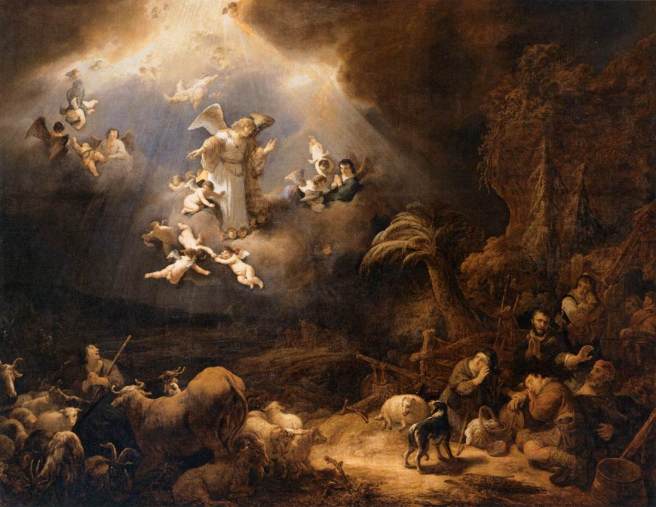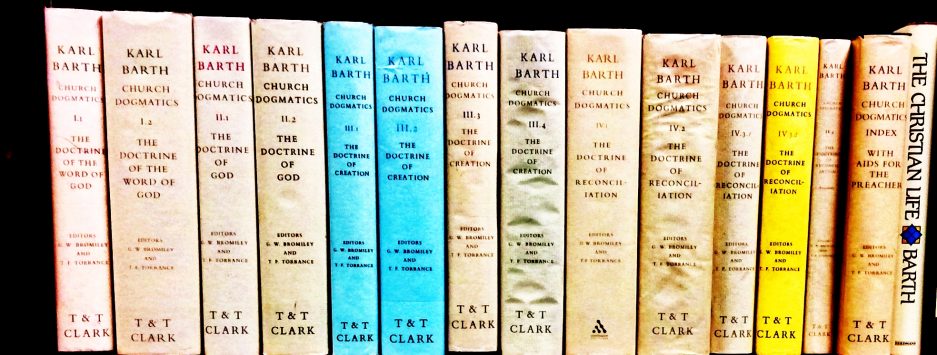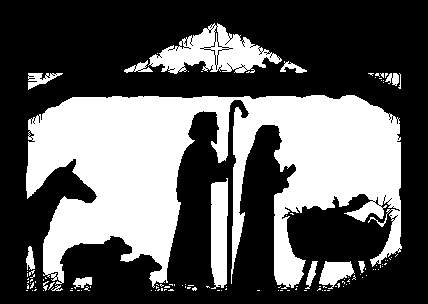
We tend to be aware of the prophetic significance of the angelic announcement of the birth of Jesus to the shepherds in Luke 2. As Christian readers we are likely to grasp how the announcement was directed to Jewish shepherds who (likely) would have seen it as a fulfilment of Hebrew prophecy.
But we may be less attuned to fact that the announcement would have also been heard by Gentile recipients reading Luke’s Gospel as a radical political statement. Both of these aspects are important to understand, so let’s look at them in order. How might a typical Jewish person hear the angelic announcement? And how might a typical Gentile or Greek hear it?
The Prophetic Significance of the Angelic Announcement
First, let’s recall what the angel told the shepherds:
“Do not be afraid. I bring you good news that will cause great joy for all the people. Today in the town of David a Savior has been born to you; he is the Messiah, the Lord.” (Luke 2:10-11).
Here I want to highlight four words or phrases from the angel of the Lord’s announcement: 1) Good News; 2) Saviour; 3) Messiah; and 4) the Lord. (2:10-11)
From a Jewish perspective, the four words would likely be received as an announcement of the fulfillment of the prophetic hope of the Hebrew Bible.
Good news – The prophet Isaiah (which has sometimes been called “The Fifth Gospel”) makes repeated mention of “good news.” (E.g., Isaiah 40:9, 41:27; 52:7). Thus, when the angel of the Lord announces that he is bringing “good news that will cause great joy for all the people,” Jewish shepherds are likely to have their minds drawn to these promises.For example, think of Isaiah 40:9 which says,
You who bring good news to Zion,
go up on a high mountain.
You who bring good news to Jerusalem,
lift up your voice with a shout,
lift it up, do not be afraid;
say to the towns of Judah,
“Here is your God!”
What is the good news? “Here is your God!” It’s no wonder the shepherds went for a look!
Saviour – The word Saviour is derived from the Hebrew name “Joshua” which literally means, “Yahweh is salvation.” When the shepherds arrive at the manger side and find out his name is “Jesus” (the Greek version of Hebrew Joshua), the connection of this baby to Israel’s promises of deliverance embodied in Joshua would have been obvious.
Messiah – This word, of course, is at the heart of Jewish hopes. The Hebrew Scriptures long predicted the coming of the anointed one. And any Jewish person who was even minimally attentive knew that the Messiah would come from the line and house of King David. Of course, that the shepherds were directed to and found their way to Bethlehem, the city of David, well, that just was icing on the cake!
Lord – But just in case the shepherds missed it, the angel of the Lord declared that the baby is “the Messiah, the Lord.” The word “Lord” (Greek, kyrios) here is loaded with significance. As Larry Hurtado points out, the word Lord or kyrios, “had become a widely-used oral substitute for YHWH among Greek-speaking Jews.” I don’t know what language the angels spoke to the shepherds in, but for Luke, there is a clear connection of the identity of the Messiah with the YHWH of the Hebrew Bible.
In short, for Jewish readers of Luke’s account, it is clear that Jesus is to be understood as the fulfillment of Jewish hopes as testified to in Hebrew Scripture. The long awaited Messiah had come, and the shepherd’s did not delay in going to see him. And when they did, they went out, witnessing to what they’d heard the angels tell them about the child (Lk. 2:17). (Notice here that their witness consisted primarily in what they heard. Although they speak both of what they heard and saw (v.20), it is the angelic message which gives content to their witness, not so much what they saw.)
The Political Significance of the Angelic Announcement
But what about for Gentiles or Greek speaking readers? How would Luke’s record of the angelic announcement resonate with them?
Here we need to run through these four words once again, but this time I want to argue that for our Gentile author, Luke, and for what we assume would be in the first instance a predominantly Gentile audience, the words elicit a radical political announcement.
Here we must not miss the connection between the opening line (“In those days Caesar Augustus issued a decree . . .”) and the proclamation of the angel of the Lord in Luke 2:10-12. It is easier to see, as above, how this announcement aligns with Hebrew expectation because we are more likely to be familiar with the Old Testament. But it is a bit less obvious to see the radical political implications of the angelic announcement apart from some extra-biblical information that most readers of the Gospel today do not have immediately at their fingertips. Remember that for most Gentiles reading or hearing the Gospel of Luke for the first time, they would have far less familiarity with the Hebrew Bible than, say, Matthew’s readers and hearers. Thus, when Luke provides his account, it is in the context of the historic figure of Caesar Augustus. Thus, the political allusions would have more likely resonated with Greek/Gentile hearers.
In short, everything that is said about Jesus by the angel as recorded by Luke was previously directly or indirectly attributed to Caesar Augustus himself. So let’s go through these four words again,but this time from the perspective of how Caesar Augustus would have been understood.
Good News – In his book, Divine Honours for the Caesars, Bruce W. Winter draws attention to a decree written by the Proconsul of the League of Asia around 8 BC which extols the virtues of Caesar Augustus—the very same Caesar spoken of in Luke 2:1. At one point, the Augustan decree says, “with his appearance Caesar [Augustus] exceeded hopes of all those who anticipated good tidings [‘euangelia’ – Gospel, good news] before us, not only surpassing those who had been benefactors before him, but not even leaving those to come any hope of surpassing him the future.” (Winter, 37).Historians generally agree that the birth of Jesus took place around 4 BC, which means that the Augustan decree spoken of by Winter had been written just four years earlier. It isn’t hard to see the radical nature, then, of the angelic announcement which declared that the birth of Jesus in Bethlehem was “good news” for “all the people.”We shouldn’t underestimate how this account is a direct “poking the bear” of none other than the mighty Caesar Augustus which just four years previously had been declared to have been the greatest leader ever and with no hope of any coming after who would surpass him. And yet, here came Jesus on the scene, announced as “good news for all the people.”All this to say: The angelic announcement as “good news” isn’t political subtlety, but a forthright declaration of challenge to the Augustan decree! One simply has to say that this was a statement of political boldness at its best!
Saviour – A year prior to the Proconsul’s 8 BC decree, there is also evidence that this same Caesar August was declared publicly to be a saviour to the people. On a Priene calendar inscription we find this:“Whereas the Providence which has guided our whole existence and which has shown such care and liberality, has brought our life to the peak of perfection in giving to us Augustus Caesar, whom it filled with virtue for the welfare of mankind, and who, being sent to us and to our descendants as a savior, has put an end to war and has set all things in order” (Emphasis added).
Moreover, an inscription from the city of Halicarnassus declared Augustus to be “saviour of the common race of man” (Cited in Winter, 72) and scholars have commonly noted how he was repeatedly called “the savior of the world” and “the savior of the inhabited earth.”The fact that Augustus was issuing a decree, according to Luke, to the “entire Roman world” (Lk 2:1) and that Luke’s genealogy of Jesus in chapter 3 traces Jesus all the way back to Adam (unlike Matthew who traces all the way back to Abraham) indicates that when Jesus is declared to be “saviour”, in a first century Gentile familiar with the honours accorded Augustus as “saviour of the common race of man,” it is beyond doubt the counter narrative Luke is providing for us. No, Luke’s Gospel says, it is not Augustus who is the Saviour of humanity, but Jesus, the man for all people.
Messiah – English translations of Luke 2:11 (such as the NIV I’m citing from) translate the last clause as “he is the Messiah, the Lord.” The word Messiah is the English transliteration of Hebrew word “Mashiach.” However, Luke, writing in Greek, records that the baby is the Christos Kurios, more directly translated in English as “Christ the Lord.” (I think English translations should opt to translate the word as “Christ” here, given Luke’s Gentile orientation, but I digress.) At any rate, both Messiah and Christ mean “anointed one.”
In Judaism, of course, the anointed one, the Messiah, is clearly associated with the prophetic anticipation of the one to come from the house of David, as noted above. Its noteworthy, then, that Jews were predisposed to be awaiting and looking for the Messiah to come, and in their looking, they were aware that the Messiah was going to be born in “Bethlehem in Judea” (Matt 2:5).
So, when Luke then goes on to begin his account of Jesus (right before the genealogy) by recording a birth announcement, the parallel to imperial power cannot be ignored. Jesus cames as Messiah and saviour for all, including all right back to the time of Adam! But Jesus also comes as the one who will be Messiah and Saviour of all to come.Here Winter points to a lengthy resolution passed by the members of the Koinon of the province of Asia. In that resolution, the birth of Caesar Augustus is viewed as the beginning of a new Golden Age and they declared that Augustus’ birthday should mark the beginning of a new calendar year to represent how with the appearance of Augustus, a new world age had begun. Indeed, an inscription to Augustus read: “the birthday of our god marked for the world the beginning of good news through his coming.” (Winter 37).
An anointing is a marking, a designating, so here again, it is not difficult to see how Luke’s portrayal of Jesus birth is so closely tied to the decree of Caesar Augustus who himself was portrayed as the harbinger of a new age. And yet it is Jesus, the angels announce, who is the anointed one, and the one who “Today” (2:11) (usually a word used in the Bible connected to the announcement of the present day arrival of the kingdom of God) has come as one bringing joy to all people.
Lord – It is as if the best is saved til last with this word. As noted above, the word Lord (kyrios) was clearly associated in Jewish thought with Yahweh, but what about in the Gentile mind?
N.T. Wright makes the claim that at the time of Jesus’ birth, “as far as most of the Roman world was concerned, the ‘divinity’ of the emperor was obvious and uncontroversial” (Wright, Paul in Fresh Perspective, 65)Here the full significance of Luke’s record of the angelic announcement comes into focus. Indeed, Caesar Augustus declared his father a deity, thus making Augustus a “son of deity (or as inscriptions put it, “a son of a god” (Cf. the title ascribed to Jesus: the son of God!).
It is widely known that the Emperors were commonly acknowledged and honoured as nothing less than deities themselves. In fact, it was because of their divine status as deities that eventually Christians found themselves in trouble whenever they found themselves declaring, “Jesus is Lord!”–but that’s for another post some day!
So, the natal announcement plays a dual role for both Jewish and Gentile hearers. For the Jew reading Luke’s account, the angelic announcement encourages them to see Jesus as the fulfillment of all Hebrew prophetic anticipation and as the one to come, the Messiah, the Son of David.
But for Gentile hearers, the natal announcement is shot through with political significance and challenge. Indeed, for many of Luke’s readers, the natal announcement is nothing less than a political counter challenge to the highest political authority of their day, namely, the Emperor himself.
And so Jesus Christ is to us today: the hope of Israel (Jeremiah 17:13) and the desire of the nations (Haggai 2:7).




